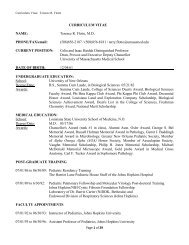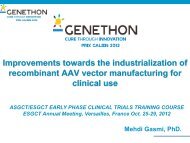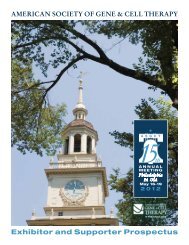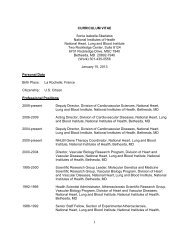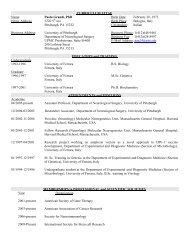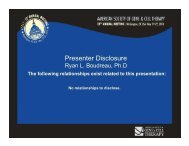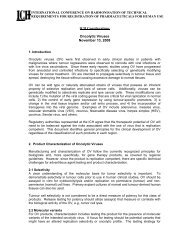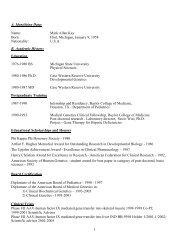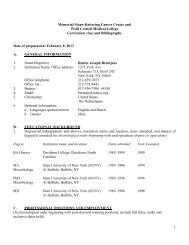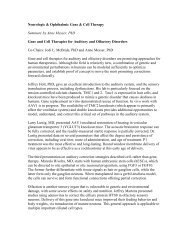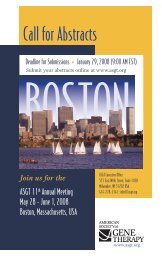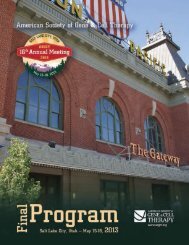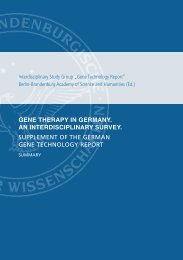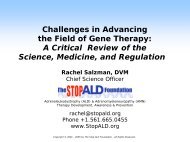FINAL PROGRAM - American Society of Gene & Cell Therapy
FINAL PROGRAM - American Society of Gene & Cell Therapy
FINAL PROGRAM - American Society of Gene & Cell Therapy
- No tags were found...
Create successful ePaper yourself
Turn your PDF publications into a flip-book with our unique Google optimized e-Paper software.
13 th AnnUAL MEETing | Washington, DC USA May 19-22, 2010 35Program ScheduleEducation Session 1223:30 pm - 5:00 pmRoom: Wilson ABCTopical Review: <strong>Cell</strong> <strong>Therapy</strong>ChairEdwin M. Horwitz, MD, PhDSpeakersEdwin M. Horwitz, MD, PhDFundamentals <strong>of</strong> <strong>Cell</strong> <strong>Therapy</strong>Peter Johnston, MD, FACCStem <strong>Cell</strong> <strong>Therapy</strong> for the HeartNearly 6 million people in the United States suffer from heart failure. This burden <strong>of</strong> disease has driven interest in stem cell therapy for the heart in the hope that dysfunctionalmyocytes and vasculature might be repaired or replaced. Clinical trials to date have explored the use <strong>of</strong> various skeletal, bone marrow-derived, endothelial, andendogenous cardiac precursor cells for cardiac repair. Along with much promise, there remain many questions about not only the optimal type <strong>of</strong> cell, but also the timingand delivery method necessary to achieve the maximal therapeutic benefit.Dao Pan, PhD<strong>Cell</strong> and <strong>Gene</strong> <strong>Therapy</strong> for CNS Abnormalities in Lysosomal Storage DisordersLysosomal storage diseases (LSD) are a group <strong>of</strong> ~40 inherited metabolic disorders with a combined incidence <strong>of</strong> 1 in 1500 to 7000 live births. More than 70% <strong>of</strong> allLSD affects the central nervous system (CNS). Bone marrow stem cell transplantation has been shown to ameliorate many visceral symptoms in some LSD patients;however CNS disease associated with LSD remains as a major challenge. Here we will discuss experimental and preclinical studies toward new therapeutic strategies,including stem cell-based brain transplantation therapies, hematopoietic stem cell gene therapies, and CNS-targeted gene therapies. Issues that are pertinent to theirpotential translational applications will also be addressed.Wednesday, May 19 thEducation Session 1233:30 pm - 5:00 pmRoom: Thurgood Marshall WTopical Review: <strong>Gene</strong> <strong>Therapy</strong> for Eye DiseasesRecent successes in viral vector-based gene therapy clinical trials underscore the potential <strong>of</strong> gene therapy as a means to provide definitive solutions for currently incurableocular diseases. This session will focus on the basic biology and vector development for ocular diseases. In addition, it will provide recent updates on novel strategies invector design, as well as the status and prospects <strong>of</strong> gene therapy clinical trials for ocular diseases.Co-ChairsPeter A. Campochiaro, MD & Tal Kafri, PhDSpeakersBill Hauswirth, PhDAAV Vector Considerations for the RetinaConsiderations for AAV vectors intended for transducing cells <strong>of</strong> the retina include 1) the anatomical site <strong>of</strong> vector injection, 2) the vector serotype, 3) the size <strong>of</strong> thevector genome, 4) the strandedness <strong>of</strong> the vector genome and 5) the ability <strong>of</strong> novel AAV vectors to penetrate retinal tissue. Each issue will be discussed in the context <strong>of</strong>gene-based therapies for degenerative retinal diseases.John G. Flannery, PhDEvolution <strong>of</strong> AAV Vectors for Ocular <strong>Gene</strong> <strong>Therapy</strong>



